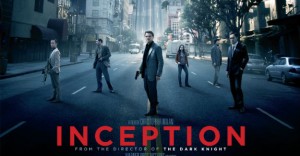
Christopher Nolan’s “Inception, which takes place in a world where people can enter dreams to steal and plant ideas, is a psychological thriller that twists and turns often.
1. “The Social Network”
In the digital age, events from 2003 might as well be ancient history. That’s what makes “The Social Network” more than a brilliant product of its time. Like “Network” back in the ’70s, this is an alternately funny and haunting vision of how a media revolution — Facebook, in this case — dramatically damaged our generation.
The film retells how narcissistic nerd Mark Zuckerberg (Jesse Eisenberg, in the year’s most emotionally complex performance) created the world’s most popular social networking site and then, infuriated, betrayed or destroyed everyone in his path. Director David Fincher and screenwriter Aaron Sorkin twist — and sometimes embellish — the story for all its wicked entertainment value. The dialogue is the most intense and verbal sparring in any film since “There Will Be Blood.” Yet, they also realize what a perfect allegory this is. As Facebook rapidly begins to take over the world, Zuckerberg gradually loses all possible human connection, leading up to a finale that proves a global network of “friends” can’t distract from a personal void. “The Social Network” is such a rare achievement: an instant classic that will only feel greater in time.
2. “Inception”
It’s strange, and a little sad, that this film earned a reputation of being ‘so confusing,’ considering how a crucial element to its dreamscape narrative is having everything thoroughly explained to viewers and then taking them along for the ride. After perfecting blockbuster filmmaking with “The Dark Knight,” Christopher Nolan opted to do something damn-near radical — craft a summertime smash that can’t be enjoyed passively. There’s so much fervent imagination throughout “Inception” that the film and its head-trip logic felt like an instant pop culture revolution. Like the subconscious web it immerses us in, “Inception” is visionary escapism of the highest order.
3. “Enter the Void”
“Inception” is much more entertaining, but as a straight-up mindfuck, nothing from this or any other year comes close to this overpowering film by Gaspar Noé. The film begins from the first-person viewpoint of Oscar (Nathaniel Brown), a low-level drug dealer in Tokyo trying to support himself and his disturbed sister. After he is killed in a failed drug bust, we spend the next two hours watching his memories and the disastrous after effects of his death from the perspective of his spirit, which seamlessly coasts through Tokyo and his own psyche.
Noe’s vision of the afterlife is an unrelenting fever dream, and whether you’re transfixed or truly sickened, “Enter the Void” really does feel like an out-of-body experience. This is one of the most otherworldly film events ever, if you can handle it.
4. “127 Hours”
In 2003, 27-year-old Aron Ralston was traveling alone in Utah when a gigantic boulder fell onto his arm, pinning him at the bottom of a canyon for six days before he amputated his own arm and escaped to tell the tale.
In “127 Hours,” Ralston’s tragedy is rendered as a kinetic one-man play. Ralston (James Franco) starts off as a self-centered free spirit, so concerned with his own adventures that he can’t bother returning his family’s calls or telling anyone his whereabouts. After his accident, Ralston’s physical hyperactivity becomes mental, and the film becomes a psychological map of what led to his tragic, but cathartic, release. True to its subject, the film revels real-life horror and bravery that, for the rest of us, seem beyond comprehension.
5. “True Grit”
The Coen Brothers have toyed with the conventions of Westerns in grim affairs like “Blood Simple” and “No Country for Old Men,” but this remake of the 1969 John Wayne movie is their most authentic stab at the genre. This isn’t just because the setting is a beautiful reconstruction of the Wild West, but also because “True Grit” is a stark, almost modest depiction of bravery. That’s best illustrated by the anti-climatic epilogue that fades the story out. It’s a mournful loose end to an otherwise thrilling revenge narrative, but it’s also what gives the film’s previous shoot-’em-up action some heart. In the end, this film means to show us that heroism truly is about the grit, not the glory.
6. “The Secret in their Eyes”
The Best Foreign Film winner from last year’s Oscars comes from Argentina, but it still feels like old-fashioned Hollywood.
The film follows Ben (Ricardo Darin), a retired investigator who decides to write a novel based on an unsolved homicide case from 25 years earlier.
The book brings back unrequited feelings of love (for a beautiful judge he worked with at the time) and injustice (the corrupt Argentinean government might have botched the case for good), fleshed out in flashback and in the present. It’s an engrossing mix of humor, romance and grisly suspense, just like they used to make ‘em.
7. “Shutter Island”
A sullen, 140-minute psychological thriller set in an insane asylum isn’t exactly light viewing. Yet this still feels like the work of a more wily, post-Oscar Scorsese. A decade ago, Scorsese was dabbling in firmly academic efforts like “Gangs of New York” and “The Aviator;” in this film, he’s clearly having some fun. It’s a great pulp indulgence that, as Hitchcock would say, is most effective as “pure cinema.”
8 & 9. “Exit Through the Gift Shop” and “I’m Still Here”
What with all the “death of secrecy” Internet buzz these days, it’s refreshing to have two new “documentaries” that can genuinely, delightfully baffle us. “Gift Shop” is a film by Banksy, the British graffiti artist of enduring anonymous fame. It details the unexpected rise of Thierry Guetta, who spends a decade evolving from a no-talent videographer to a world famous artist called “Mr. Brainwash” (still no talent needed). It’s an ingenious attack on the art world by itself, but some claim that the whole thing is actually Banksy’s most elaborate, inventive trick on us all.
“I’m Still Here” chronicles Joaquin Phoenix’s “lost year” in 2009 when he “retired” from acting to pursue a rap career, take up several drug addictions, and generally turn himself into a household joke.
Even when the film clearly seems like a double-edged publicity stunt, you have to wonder just how disturbed Phoenix really was to live out this long, absurd prank so seriously.
The two films differ in that Banksy insists his is real, while Phoenix insists the exact opposite; regardless, both films will be the topic of confused fascination for many years to come.
10. “The King’s Speech”
It’s all about the presentation. That’s both a central message of “The King’s Speech” and also a central reason for the film’s success, as it takes a most unusual course in presenting a tale of fairly usual uplift. The speech impediment of King George VI (Colin Firth) is used as a window into royal dysfunction and European unrest leading up to the beginning of World War II.
But most importantly, it’s a window into the King himself — Firth excels at channeling the all-consuming humiliation of a leader who is terrified of being center stage and letting his country down.
So while we clearly know where this story is headed as the King works with an eccentric speech therapist (Geoffrey Rush) to overcome his debilitating affliction, what’s much more surprising is how truly victorious the experience feels.
Worst Films of the Year
On the complete opposite end of the quality spectrum, Tim Burton’s “Alice in Wonderland” is the worst movie of 2010, and I knew that even before Johnny Depp started break-dancing at the end of the film.
It’s hard to completely waste Depp’s talents, and even harder to retell “Alice in Wonderland” without any feeling of inspired imagination. But Burton approaches the material like it’s just business as usual, turning Wonderland into a tiring, empty parade of quirks. And he does the same to his leading man.
Other sad affairs that wasted my time last year: “The Expendables,” “The Twilight Saga: Eclipse,” “Babies,” “Splice,” “The Kids Are All Right,” “Cop Out,” “Fish Tank,” “Never Let Me Go” and “Due Date.”
Silverstein is a member of the class of 2013.




